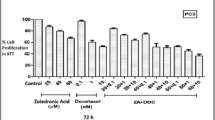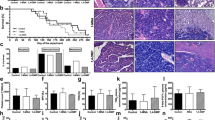Abstract
Docetaxel is a new taxoid compound with a broad spectrum of antitumor activity. Previous studies have shown that in vitro treatment of specific human tumor lines with docetaxel is associated with the phosphorylation and inactivation of the bcl-2 protein and the occurrence of apoptosis. The goal of this study was to examine whether bcl-2 expression is truly required for in vivo responsiveness to docetaxel. The expression and state of phosphorylation of bcl-2 was examined in human MX-1 breast or DU-145 prostate tumors explanted from nu/nu mice treated with docetaxel. The MX-1 cells accumulated in the G2/M phase of the cell cycle and exhibited phosphorylation of bcl-2 after treatment with docetaxel. By Western blot analysis DU-145 prostate tumor cells did not express bcl-2 protein before or following in vivo treatment with docetaxel. However, docetaxel was highly active against the DU-145 tumor xenograft model. Thus, docetaxel induces apoptosis and cell death through a different, bcl-2-independent mechanism in the DU-145 human prostate tumor, indicating that bcl-2 may not have prognostic value for treatment with docetaxel.
Similar content being viewed by others
References
Denis JN, Greene AE, Guenard D, Gueritte-Voegelein F, Mangatal L, Potier P: A highly efficient, practical approach to natural taxol. J Am Chem Soc 110: 5917–5919, 1988
Mangatal L, Adeline MT, Guenard D, Gueritte-Voegelein F, Potier, P: Application of the vicinal oxyamination reaction with asymmetric induction to the hemisynthesis of taxol and analogues. Tetrahedron 45: 4177–4190, 1989
Garcia P, Braguer D, Carles G, el Khyari S, Barra Y, de Ines C, Barasoain I, Briand C: Comparative effects of taxol and Taxotere on two different human carcinoma cell lines. Cancer Chemother Pharmacol 34: 335–343, 1994
Lavelle F, Bissery MC, Combeau C, Riou JF, Vrignaud P, Andre S: Preclinical evaluation of docetaxel (Taxotere). Semin Oncol 22: 3–16, 1995
Stein CA: Mechanisms of action of taxanes in prostate cancer. Semin Oncol 26: 3–7, 1999
Pienta KJ: Preclinical mechanisms of action of docetaxel and docetaxel combinations in prostate cancer. Semin Oncol 28: 3–7, 2001
Bissery MC, Guenard D, Gueritte-Voegelein F, Lavelle F: Experimental antitumor activity of taxotere (RP 56976, NSC 628503), a taxol analogue. Cancer Res 51: 4845–4852, 1991
Bissery MC, Nohynek G, Sanderink GJ, Lavelle F: Docetaxel (Taxotere): a review of preclinical and clinical experience. Part I: Preclinical experience. Anticancer Drugs 6: 339–8, 1995
Dykes DJ, Bissery MC, Harrison SD, Waud WR: Response of human tumor xenografts in athymic nude mice to docetaxel (RP 56976, Taxotere). Invest New Drugs 13: 1–11, 1995
Friedland D, Cohen J, Miller R, Voloshin M, Gluckman R, Lembersky B, Zidar B, Keating M, Reilly N, Dimitt B: A phase II trial of docetaxel (Taxotere) in hormone-refractory prostate cancer: correlation of antitumor effect to phosphorylation of bcl-2. Semin Oncol 26: 19–23, 1999
Picus J, Schultz M: Docetaxel (Taxotere) as monotherapy in the treatment of hormone-refractory prostate cancer: preliminary results. Semin Oncol 26: 14–18, 1999
Kreis W, Budman DR, Fetten J, Gonzales AL, Barile B, Vinciguerra V: Phase I trial of the combination of daily estramustine phosphate and intermittent docetaxel in patients with metastatic hormone refractory prostate carcinoma. Ann Oncol 10: 33–38, 1999
Petrylak DP, Macarthur RB, O'Connor J, Shelton G, Judge T, Balog J, Pfaff C, Bagiella E, Heitjan D, Fine R, Zuech N, Sawczuk I, Benson M, Olsson CA: Phase I trial of docetaxel with estramustine in androgen-independent prostate cancer. J Clin Oncol 17: 958–967, 1999
Haldar S, Jena N, Croce CM: Inactivation of bcl-2 by phosphorylation. Proc Natl Acad Sci USA 92: 4507–4511, 1995
Haldar S, Chintapalli J, Croce CM: Taxol induces bcl-2 phosphorylation and death of prostate cancer cells. Cancer Res 56: 1253–1255, 1996
Haldar S, Basu A, Croce CM: bcl2 is the guardian of microtubule integrity. Cancer Res 57: 229–233, 1997
Nehme A, Varadarajan P, Sellakumar G, Gerhold M, Niedner H, Zhang Q, Lin X, Christen RD: Modulation of docetaxel-induced apoptosis and cell cycle arrest by all-trans retinoic acid in prostate cancer cells. Br J Cancer 84: 1571–1576, 2001
Reed JC: Regulation of apoptosis by bcl-2 family proteins and its role in cancer and chemoresistance. Curr Opin Oncol 7: 541–546, 1995
Reed JC: bcl-2 family proteins: regulators of apoptosis and chemoresistance in hematologic malignancies. Semin Hematol 34: 9–19, 1997
Schmitt E, Sane AT, Steyaert A, Cimoli G, Bertrand R: The bcl-xL and Bax-alpha control points: modulation of apoptosis induced by cancer chemotherapy and relation to TPCK-sensitive protease and caspase activation. Biochem Cell Biol 75: 301–314, 1997
Haldar S, Jena N, DuBois GC, Takayama S, Reed JC, Fu SS, Croce CM: Purification and characterization of the bcl-2 protein. Arch Biochem Biophys 315: 483–488, 1994
Yin XM, Oltvai ZN, Korsmeyer SJ: BH1 and BH2 domains of bcl-2 are required for inhibition of apoptosis and heterodimerization with Bax. Nature 369: 321–323, 1994
Miyashita T, Reed JC: bcl-2 gene transfer increases relative resistance of S49.1 and WEHI7.2 lymphoid cells to cell death and DNA fragmentation induced by glucocorticoids and multiple chemotherapeutic drugs. Cancer Res 52: 5407–5411, 1992
Kitada S, Takayama S, De Riel K, Tanaka S, Reed JC: Reversal of chemoresistance of lymphoma cells by antisense-mediated reduction of bcl-2 gene expression. Antisense Res Dev 4: 71–79, 1994
Pepper C, Bentley P, Hoy T: Regulation of clinical chemoresistance by bcl-2 and bax oncoproteins in B-cell chronic lymphocytic leukaemia. Br J Haematol 95: 513–517, 1996
Krajewski S, Blomqvist C, Franssila K, Krajewska M, Wasenius VM, Niskanen E, Nordling S, Reed JC: Reduced expression of proapoptotic gene BAX is associated with poor response rates to combination chemotherapy and shorter survival in women with metastatic breast adenocarcinoma. Cancer Res 55: 4471–4478, 1995
Dole MG, Jasty R, Cooper MJ, Thompson CB, Nunez G, Castle VP: bcl-xL is expressed in neuroblastoma cells and modulates chemotherapy-induced apoptosis. Cancer Res 55: 2576–2582, 1995
Fang W, Rivard JJ, Ganser JA, LeBien TW, Nath KA, Mueller DL, Behrens TW: bcl-xL rescues WEHI 231 B lymphocytes from oxidant-mediated death following diverse apoptotic stimuli. J Immunol 155: 66–75, 1995
Lebedeva I, Rando R, Ojwang J, Cossum P, Stein CA: bcl-xL in prostate cancer cells: effects of overexpression and down-regulation on chemosensitivity. Cancer Res 60: 6052–6060, 2000
Costa A, Licitra L, Veneroni S, Daidone MG, Grandi C, Cavina R, Molinari R, Silvestrini R: Biological markers as indicators of pathological response to primary chemotherapy in oral-cavity cancers. Int J Cancer 79: 619–623, 1998
Guinan P, Didomenico D, Brown J, Shaw M, Sharifi R, Ray V, Shott S, Rubenstein M: The effect of androgen deprivation on malignant and benign prostate tissue. Med Oncol 14: 145–152, 1997
Hermine O, Haioun C, Lepage E, d'Agay MF, Briere J, Lavignac C, Fillet G, Salles G, Marolleau JP, Diebold J, Reyas F, Gaulard P: Prognostic significance of bcl-2 protein expression in aggressive non-Hodgkin's lymphoma. Groupe d'Etude des Lymphomes de l'Adulte (GELA). Blood 87: 265–272, 1996
Hogarth LA, Hall AG: Increased BAX expression is associated with an increased risk of relapse in childhood acute lymphocytic leukemia. Blood 93: 2671–2678, 1999
Logsdon MD, Meyn RE, Besa PC, Pugh WC, Stephens LC, Peters LJ, Milas L, Cox JD, Cabanillas F, Brisbay S, Andersen M, McDonnell TJ: Apoptosis and the bcl-2 gene family — patterns of expression and prognostic value in stage I and II follicular center lymphoma. Int J Radiat Oncol Biol Phys 44: 19–29, 1999
Makris A, Powles TJ, Dowsett M, Osborne CK, Trott PA, Fernando IN, Ashley SE, Ormerod MG, Titley JC, Gregory RK, Allred DC: Prediction of response to neoadjuvant chemoendocrine therapy in primary breast carcinomas. Clin Cancer Res 3: 593–600, 1997
Sangfelt O, Osterborg A, Grander D, Anderbring E, Ost A, Mellstedt H, Einhorn S: Response to interferon therapy in patients with multiple myeloma correlates with expression of the bcl-2 oncoprotein. Int J Cancer 63: 190–192, 1995
De Cesare M, Pratesi G, Giusti A, Polizzi D, Zunino F: Stimulation of the apoptotic response as a basis for the therapeutic synergism of lonidamine and cisplatin in combination in human tumour xenografts. Br J Cancer 77: 434–439, 1998
Tang DG, Li L, Chopra DP, Porter AT: Extended survivability of prostate cancer cells in the absence of trophic factors: increased proliferation, evasion of apoptosis, and the role of apoptosis proteins. Cancer Res 58: 3466–3479, 1998
Van Brussel JP, van Steenbrugge GJ, Romijn JC, Schroder FH, Mickisch GH: Chemosensitivity of prostate cancer cell lines and expression of multidrug resistance-related proteins. Eur J Cancer 35: 664–671, 1999
Griswold DP, Schabel FM, Wilcox WS, Simpson-Herren L, Skipper HE: Success and failure in the treatment of solid tumors. I. Effects of cyclophosphamide (NSC-26271) on primary and metastatic plasmacytoma in the hamster. Cancer Chemother Rep 52: 345–387, 1968
Veis DJ, Sentman CL, Bach EA, Korsmeyer SJ: Expression of the bcl-2 protein in murine and human thymocytes and in peripheral T lymphocytes. J Immunol 151: 2546–2554, 1993
Dean PN, Jett JH: Mathematical analysis of DNA distributions derived from flow microfluorometry. J Cell Biol 60: 523–527, 1974
Marquardt DW: An algorithm for least-squares estimation of nonlinear parameters. Appl Math 11: 431–441, 1963
Pantazis P, Chatterjee D, Wyche J, DeJesus A, Early J, Plaschke S, Giovanella B: Establishment of human prostate tumor xenografts in nude mice and response to 9–nitrocamptothecin in vivo and in vitro does not correlate with the expression of various apoptosis-regulating proteins. J Exp Ther Oncol 1: 322–333, 1996
Pratesi G, Polizzi D, Perego P, Dal Bo L, Zunino F: bcl-2 phosphorylation in a human breast carcinoma xenograft: a common event in response to effective DNA-damaging drugs. Biochem Pharmacol 60: 77–82, 2000
Schimming R, Mason KA, Hunter N, Weil M, Kishi K, Milas L: Lack of correlation between mitotic arrest or apoptosis and antitumor effect of docetaxel. Cancer Chemother Pharmacol 43: 165–172, 1999
Veitia R, Bissery MC, Martinez C, Fellous A: Tau expression in model adenocarcinomas correlates with docetaxel sensitivity in tumour-bearing mice. Br J Cancer 78: 871–877, 1998
Van Oosterom AT: Docetaxel (Taxotere): an effective agent in the management of second-line breast cancer. Semin Oncol 22: 22–28, 1995
Shirahama T, Sakakura C, Sweeney EA, Ozawa M, Takemoto M, Nishiyama K, Ohi Y, Igarashi Y: Sphingosine induces apoptosis in androgen-independent human prostatic carcinoma DU-145 cells by suppression of bcl-X(L) gene expression. FEBS Lett 407: 97–100, 1997
Author information
Authors and Affiliations
Rights and permissions
About this article
Cite this article
Kraus, L.A., Samuel, S.K., Schmid, S.M. et al. The mechanism of action of docetaxel (Taxotere®) in xenograft models is not limited to bcl-2 phosphorylation. Invest New Drugs 21, 259–268 (2003). https://doi.org/10.1023/A:1025436307913
Issue Date:
DOI: https://doi.org/10.1023/A:1025436307913




